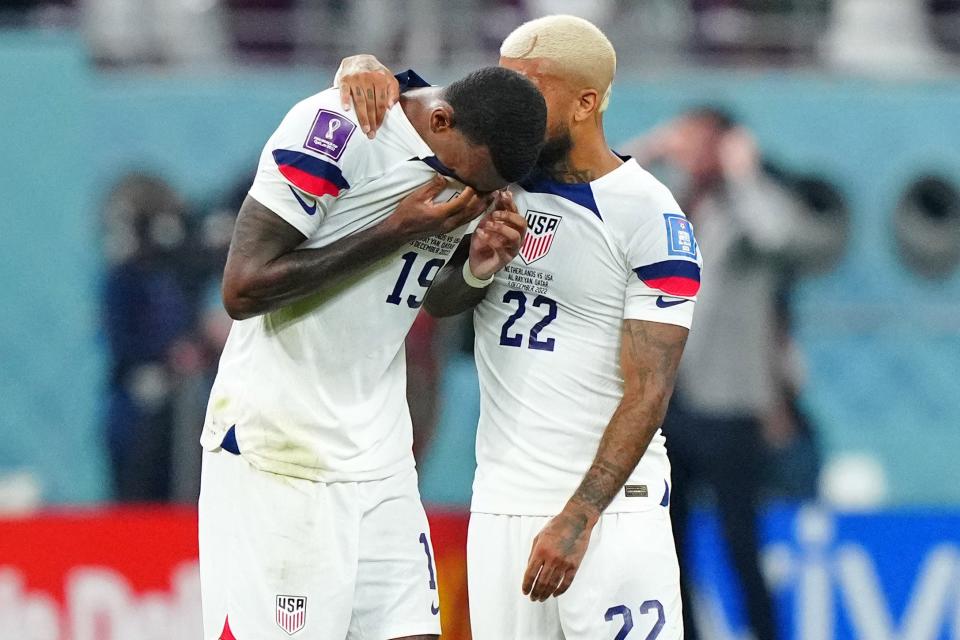Culture USMNT built during this World Cup is central to its continued progress | Opinion
DOHA, Qatar — The U.S. men have been here before. Several times in fact, and each time there’s a promise this will be a stepping stone, that the USMNT will be better at the next World Cup because of the lessons learned.
Yet it never happens. So how, the U.S. players were asked after another round of 16 exit, are they so certain this time will be different?
In a word, culture.
Yes, this team has more talent than any previous U.S. team, with a foundation established to ensure more keeps coming. But it is the players' belief in one another, their complete buy-in to the team, that will keep them progressing.
"People see the talent on this team and they get excited. I think the camaraderie with this team is exciting," said DeAndre Yedlin, who came to Qatar as the only U.S. player with World Cup experience, having played in 2014. "There’s going to be some guys that won’t be a part of the next one, there’s going to be some people that leave the group. But we’ve built a foundation and a culture that, if guys don’t fit into that culture, then they probably won’t be with the group.
"It’s a brotherhood. I’m really proud of that culture we’ve built."
MORE: Netherlands tops USMNT 3-1

There are plenty of reasons the U.S. men have never had anything close to the success of the U.S. women, who are two-time defending World Cup champions and have four titles overall. The women’s game doesn’t yet have the same competitive depth because of decades of engrained discrimination – women in England were banned from playing soccer from 1921 to 1971, for goodness' sake – and Title IX gave the USWNT a head start on almost every other country.
U.S. Soccer, for all its faults, also invested in its women’s team in a way few other countries did until the last decade or so. College soccer provides a direct and steady pipeline for the national team.
But the USWNT also long ago established a culture of success that is passed along from generation to generation. A player comes into the USWNT knowing there are certain expectations, and you either meet them or you’re gone. Even the most talented players conform to the team, rather than having the team conform to them.
The USMNT has never quite had that. Pride in country, of course. Cohesiveness during an event, sure. Strong bonds between certain players, absolutely.
But a teamwide ethos, top to bottom, that carries over from one squad to the next, one tournament to the next? Not really.
Which makes sense. For much of the USWNT’s existence, the USWNT was the only game around once players were done with college. Or the only one that offered stability and financial certainty. The men had more, and often more lucrative, options.
Christian Pulisic, for example, makes almost $9.6 million a year playing for Chelsea. The money he gets from U.S. Soccer is pocket change by comparison.
That’s not to suggest the U.S. men are mercenaries or don’t care about representing their country. Neither could be further from the truth. But there is a level of commitment with the USWNT that comes from being dependent on one another that the USMNT has never had. Never had to have.
Until now.
Criticize Gregg Berhalter’s tactical strategy and substitutions all you want. But creating an enduring culture has been as important to him as identifying talent, and he has never wavered in that. By creating a culture, you foster accountability. With accountability comes increased expectations.
Because of the culture the USWNT has established, anything less than a title, or at least a final, is viewed as a disappointment. That’s where the USMNT wants to be.
"That’s part of changing the expectations of our fans, changing the expectations of the players in the locker room. Not feeling like we won a trophy just because we moved to the round of 16," goalkeeper Matt Turner said. "We want to be able to compete for these trophies, compete with these teams."
It’s not clear yet whether Berhalter will remain the USMNT coach for the next cycle; while he spoke of an eight-year project Friday, he was noncommittal Saturday. Regardless of whether it’s him or someone else in the role, however, they have to continue nurturing this culture that Berhalter began.
The United States is co-hosting the 2026 World Cup with Canada and Mexico. With the caliber of talent the USMNT already has, young players who will be in their prime four years from now, the idea of contending for the World Cup on home soil is not far-fetched.
But it won’t happen if it’s just a group of guys who come together every few months for national team camps. It has to be this brotherhood that recognized they were better as a collective than as individuals and, in doing so, endeared themselves to the U.S. public and gave the world a glimpse of their potential.
"I do feel like we’ve made progress," Berhalter said. "I feel like when you look at our team, there’s a very clear identity of what we’re trying to do. We have a group that’s extremely committed to each other, to what they’re trying to accomplish on the field."
The 2026 World Cup will determine whether the USMNT is truly different or if this tournament was a one-off. The clock is already ticking.
Follow USA TODAY Sports columnist Nancy Armour on Twitter @nrarmour.
This article originally appeared on USA TODAY: USMNT must stay on this path to ensure future World Cup success

 Yahoo Movies
Yahoo Movies 
